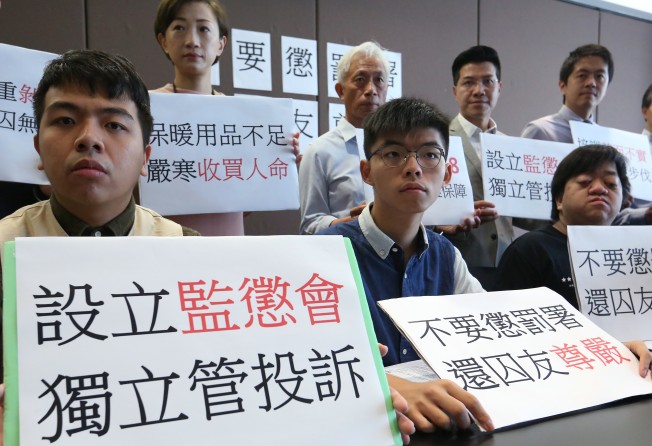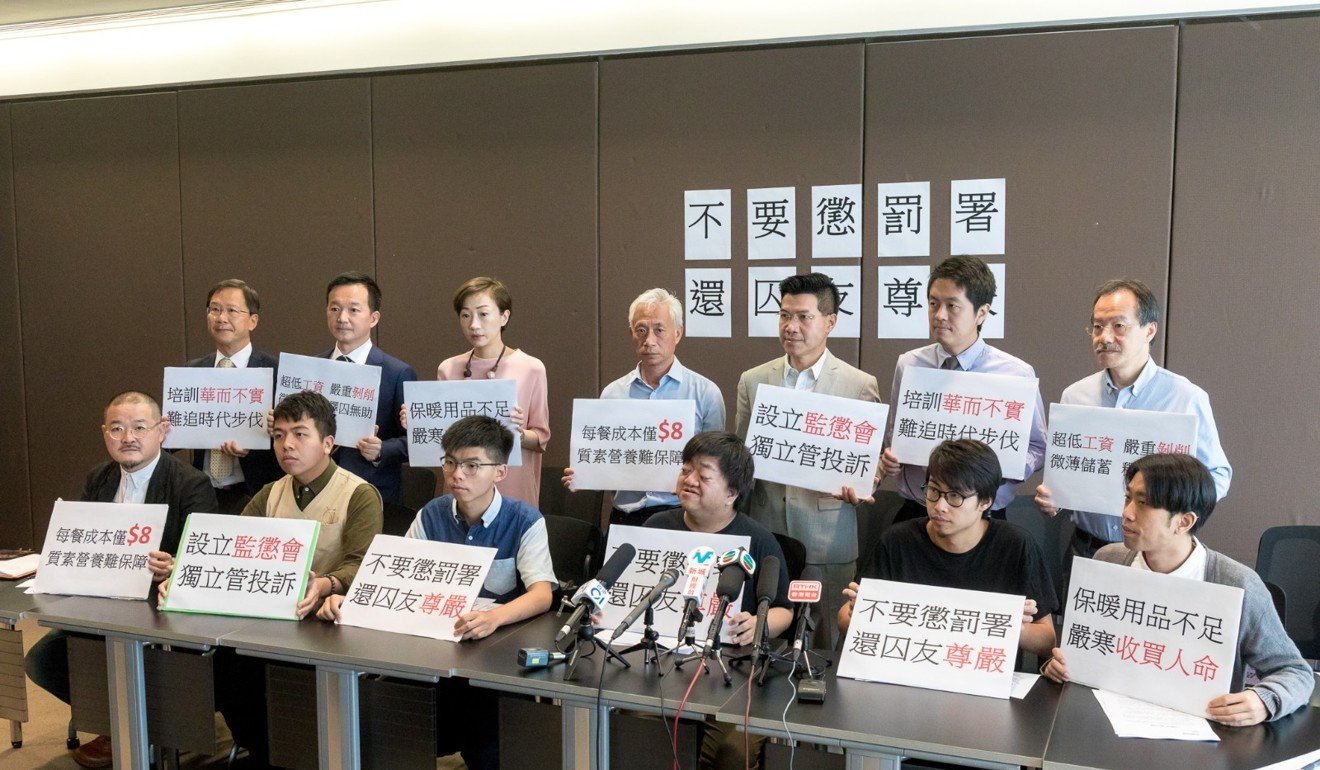Independent council to monitor Hong Kong prisons needed to protect inmate rights, lawmakers and activists say
Group releases report saying wages for inmates, who work a minimum of six hours per day, are too low and they cannot afford basic necessities

An independent council should be set up to review and monitor the operation of Hong Kong’s prisons, detention and rehabilitation centres run by the Correctional Services Department to protect the basic human rights of prisoners, a group of pro-democratic lawmakers has said.
The group, led by social welfare lawmakers Shiu Ka-chun and Fernando Cheung Chiu-hung, released a study of the prisoners’ rights and conditions on Tuesday, which was based on the experiences of 16 young activists who were or are currently jailed, with visits carried out by the lawmakers since last May.
Shiu said the 12-page report was a “proposal of goodwill” for the department, which has been responsible for the “important and difficult” work.
“We only wish for faster and more substantial changes so that the values of humanity and rationality – which are written in the Hong Kong Bill of Rights and the UN Standard Minimum Rules for the Treatment of Prisoners – can be realised,” Shiu said.
The Legislative Council’s security panel, chaired by pro-establishment lawmaker Gary Chan Hak-kan, is set to visit Pak Sha Wan Correctional Institution on April 10. Shiu, a member of the panel, promised to follow up on the prisoners’ welfare issues by requesting to inspect places not included in the institution’s presentation during the visit.
According to the report, the wage for prison inmates was so low that many of them could barely afford daily necessities sold at market price in the institutions, or to have enough savings to live on before they found a decently paid job after release.
A prison inmate could earn around HK$44 (US$5.64) to HK$192 a week by do at least six hours of industrial work a day. The best hourly wage was HK$6.40, about one-sixth of Hong Kong’s minimum wage of HK$34.50, the report said.
In Tong Fuk Correctional Institution, a weekly payment of HK$44 could be used up for two bottles of shampoo – which cost HK$20 to HK$30 each, and would not be enough for a pack of cigarettes of between HK$45 and HK$50, according to David Chu Wai-chung.

Chu, 26, was sentenced to 13 months in jail last August for taking part in a June 2014 protest and released on bail in February.
In 2017 the total commercial value of products and services produced by a daily average of 4,529 people in custody engaged in industrial work was HK$454.1 million, according to the department’s annual report.
That means each working person in custody produced a commercial value of HK$274.70 per day, and each of their daily minimum six working hours was worth more than HK$45.
Their savings from work at the time of discharge – about HK$600, according to an ex-offenders study by the Society for Community Organisation in 2009 – was not enough to live on before a decently paid job was found.
Another obstacle on the path to rehabilitation and reintegration was the limited provision of educational and vocational training programmes in the correctional institutions, according to the lawmakers’ report.
Pro-democracy activist Joshua Wong Chi-fung, 21, said he was only offered a high school preparatory course, of which the academic level was equivalent to that of Secondary Three, when he was jailed at Pik Uk Correctional Institution from August last year to October.
Wong was sentenced to six months’ imprisonment in Pik Uk – the only detention centre for male juvenile offenders – after being convicted of unlawful assembly over a protest in September 2014.
“In Pik Uk, the woodwork training has courses from entry level to high level but the hairstyling and cooking training only have entry-level courses, which bar certain inmates from obtaining a higher level of skills needed for finding a job after their discharge,” Wong said.
Chu said educational and vocational programmes that were “closer to the actual needs of the labour market” should be provided, and the department should survey how efficient these programmes have been in helping ex-offenders find employment and reintegrate into society.
Other problems revealed in the report included the procedures for making a complaint. Filing a grievance was discouraged because an inmate would have to ask for a complaint form from the guarding officers.
Wong said an officer tried to persuade him to drop his complaints after he filed two last September.
One of the activists said food and clothing were of a dissatisfactory quality, and that inmates at Tong Fuk in Lantau had no choice but to break the rules by wearing pyjamas under their trousers when the temperature dropped to three degrees Celsius in winter. Lawmaker Leung Yiu-chung, who has been visiting prisoners since 1996, said medical care was “very bad”.
Legislator Fernando Cheung said the report has “opened the black box” and many more details of prison routine were yet to be disclosed.
“Therefore we need an independent committee to lead the reform of the whole correctional services system,” Cheung said.
Cheung’s colleague Shiu Ka-chun said the independent council should have members from an array of stances and professions, including those who might disagree with the government.
In response to the report, a department spokesman said membership of the Correctional Services Department Complaints Appeal Board would rise to 18 members from the current 10 justices of the peace after mid-2018 to “enhance the independence of the appeal mechanism”. Also, prisoners’ wage rates were approved by the commissioner of correctional services and reviewed every year according to the consumption situation.
The department said that more than 1,400 training places in 41 full-time and part-time vocational training courses were available for those in custody and 80 per cent of adult ex-offenders were employed according to its six-month follow-up survey.